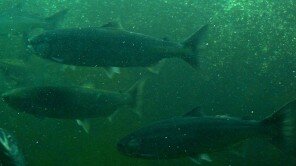
It is not often, I think, that Canadian environmentalists have recourse to shaming their government by pointing to the U.S. being out in front on an issue, but that is the case with the study of infectious salmon anemia (the ISA virus, or the salmon “flu” as we’re calling it). Activist-biologist Alexandra Morton, who sent the initial fish suspects in for questioning, writes on her blog:
It is a big deal to Canada whether this virus is here or not because it has impact on barriers to trade. This is not an issue of simple biology, this affects companies owned by the Norwegian government and others.
While there has been no comment at all from Fisheries and Oceans in BC, the US is taking this seriously.
Now, reports Seattlepi.com: “the ISA virus was found in the fins of three adult salmon–a Chinook, a chum and a coho–taken out of the Harrison River in the Fraser Valley early last month.” However, they go on to say, “additional testing on the [first] sockeye smolts, done at the University of Bergen in Norway, was not able to confirm the findings.”
Only one of the tests showed a fish with ISAv, and that was at the limits of detectability, so it was not really a smoking fin. (Somewhat embarrassedly, Morton writes that storing the fish in a “home-type freezer was not optimal” in terms of potentially preserving the virus in pristine condition.)
With new reports of ISAv, the atmosphere becomes more tense. “[S]imilar to the sockeye from River’s Inlet, the Coho in the Fraser River was infected with the European strain of ISA virus. But we see from this report that a chinook salmon and a chum salmon also tested positive,” notes Morton.
In a way, it’s strange that the salmon farming industry in BC has been downplaying the chance of ISA making its way into their fish stocks. For one thing, farmed salmon are, because of their close quarters, most susceptible to the virus becoming epidemic. For another, so far it’s farmed Atlantic salmon who are symptomatic for ISAv–wild Pacific salmon can be carriers but tend not to die from it. The concern, is that as the virus mutates, that could change, and wreak havoc on salmon hatcheries. But with farmed Atlantic salmon, the danger is present from day one.
You’d think that, with the contagiousness of ISAv well established, you could expect Canadian authorities to be justifiably paranoid about it slipping in with hatchery eggs. But Morton claims that, contrary to the government’s insistence:
Surface disinfection is a guideline, not a regulation and DFO is not sure if the fish farmers were doing it and the DFO Director General of Science waived the Fish Health Protection Regulations in 2004 to allow eggs from a hatchery that does not meet these regulations.
Our U.S. salmon senators have banded together, Republican and Democrat alike, to proffer an amendment, since passed, that says the U.S. will not wait to see what Canada finds, but will move quickly to perform its own testing and prepare for the virus’s arrival. “The amendment requires a report be delivered to Congress within six months which outlines surveillance, susceptibility of species and populations, gaps in knowledge, and recommendations for action,” says Seattlepi.com.
UPDATE: From the Vancouver Sun:
“There are no confirmed cases of ISA in wild or farm salmon in B.C.,” said Con Kiley, the Canadian Food Inspection Agency’s national aquatic animal health program director. […]
However, questions remain because of the poor quality of the samples and federal officials agreed more testing is needed.
“The supplementary results must be considered inconclusive because of the poor quality of the samples,” Kiley said.
“Additional testing will continue and the results will be provided when we are ready.”
A commenter responds to the news. Given the back-and-forth up north, U.S. citizens may be happy that our own tests will be underway to keep an eye out for the virus’s appearance.
